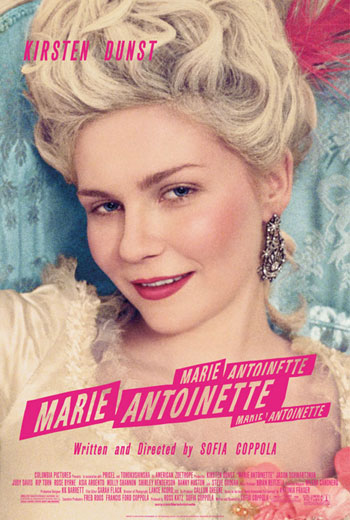 The Coppola clan is well represented in Marie Antoinette: director Sofia hired her brother Roman to shoot second unit, and she brought in her cousin Jason Schwartzman, son of Francis Ford Coppola’s sister Talia Shire, to play Louis XVI, doomed King of France.
The Coppola clan is well represented in Marie Antoinette: director Sofia hired her brother Roman to shoot second unit, and she brought in her cousin Jason Schwartzman, son of Francis Ford Coppola’s sister Talia Shire, to play Louis XVI, doomed King of France.
In the film Schwartzman has to act like he’s incapable of or unwilling to have sex with Kirsten Dunst. This is like a reader Rorschach test, I think – some of you will find this to be the pinnacle of pretending while some of you will totally understand where the character is coming from. But regardless of how you hot you do or don’t think Dunst is, you have to admit that Schwartzman has been carving out an interesting career after exploding with Rushmore. While not everything he’s done has been great (S1m0ne, ugh), he has taken interesting roles (Spun, I <3 Huckabees), and he makes the most out of a very, very quiet role in Marie Antoinette.
This roundtable interview happened at Sony’s midtown Manhattan headquarters, in one of the conference rooms on one of the music floors. Huge speakers dominated the walls – obviously guys in suits would come in to this giant room and listen to demos. Schwartzman had been in a Sony label band, and he was obviously unhappy with how the execs lived: “Do you think this is the optimal environment to experience someone’s creativity?”
Q: What was it like to gain 40 pounds for the role?
Schwartzman: It was worth it. Sofia had said to me that she would like me to put on a little weight. I asked her how much and she said, ‘Just start doing it and we’ll know when we see it.’ I was a little nervous because they say it’s bad for you to put on a lot of weight quickly and I had about six weeks to put on 45 pounds. They said they would get me a cardiologist and a nutritionist and all this stuff… and they didn’t. No one ever called me ever. I waited around for two weeks and then I said, ‘I have to gain some weight very soon,’ so I just did it myself.
I ate all organically, no processed sugars or fats. We know enough about that in this day and age to not eat McDonald’s. I did it sort of healthy – I just increased the amount of food I ate. I wasn’t hungry for about eight months because I never stopped eating. It was just one big meal.
The moment I knew it was really a bad situation was when I had doughnuts next to my bed and I would set my alarm for 3 in the morning and I would eat them in the middle of the night because they say that’s the worst time to eat food. You’re not doing anything.
Q: You just said you didn’t eat processed sugars!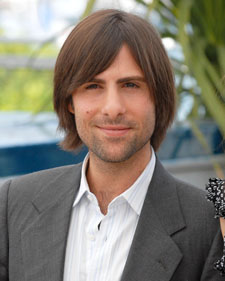 Schwartzman: They were healthy doughnuts.
Schwartzman: They were healthy doughnuts.
Q: Where do you find those?
Schwartzman: Whole Foods. In the bakery section. Naturally fruit juice sweetened Fabes doughnuts.
Q: How about losing it?
Schwartzman: Losing it was almost the opposite of how I gained it. But then they did give me a nutritionist and a membership at a gym, and I worked out every day and all day long. But it was well worth it, I thought.
It was worth the weight.
Q: There’s not a lot of dialogue in this film. How do you, as an actor, get your emotions and thoughts across without much to say at all.
Schwartzman: All three of Sofia’s films are sparse. There’s a lot of space in her films. To be a character who doesn’t say a lot in a Sofia Coppola movie – you know you’re not saying much. And he was a quiet, quiet man.
I suppose the way that I approached it is that he had a lot that he wanted to say. I played it, instead of being a person who just says one line and that’s all that he’s thinking about on that topic, or playing it like he wants to be somewhere else, what I could relate to is that he wanted to communicate and the inner, quiet frustration of not being able to put words together in the correct way. When someone asks you a question you say something and it’s perplexing to them and it’s disappointing and didn’t come out the right way. I tried to have it so that for every line that I say there are ten more that I was trying to say, wanted to express. So instead of playing someone who didn’t say anything, it was someone who couldn’t say anything. There was a longing. And he couldn’t look her in the eye because he wanted to look somewhere else, but because he was trying so hard to relate to her. I’ve been in situations with people where I am awkward and there are things that I want to say and they don’t come out right.
And I was very specific about what I didn’t say. We thought them all out – Sofia and I wrote lines that I would keep in my head that I was trying to say.
Q: In that fishbowl environment you couldn’t really just open your mouth and say what was on your mind.
Schwartzman: No, they were on display to everybody. You had to be correct. There was so much protocol, so much distraction from real moments.
But yeah, everything was pretty much all figured out. I just went to Sofia’s apartment and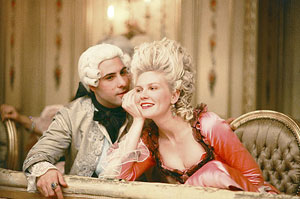 we would go over each scene and we wrote dialogue. I memorized lines I didn’t say to try to make that happen.
we would go over each scene and we wrote dialogue. I memorized lines I didn’t say to try to make that happen.
Sofia encouraged me to take time before I answered. A lot of directors say, ‘Do it faster,’ but Sofia said, ‘Take longer. Don’t try to make her comfortable. Don’t try to please her.’
Q: What was the source of his sexual frustration?
Schwartzman: There was debate. That’s the thing with this character – the more I researched him and the more historians I spoke to, the data I gathered… people debate him and have definite different conclusions of who he was, especially about this sexual fiasco. The idea that’s in the film, which I can get behind, is that he was an awkward gentleman who was put in an arranged at a very young age with someone who was just as nervous about coming to this place and being put into bed with and being expected to produce an heir in front of people. I feel it wasn’t a great environment. And I think he was an awkward person.
Q: When you’re working with family, how is the dynamic on set?
Schwartzman: It’s funny, working on a film set is like family anyway. It’s an awkward business – you get together with strangers, get to know them very well and then you make a lot of promises to see each other and you don’t. Maybe that is like a real family.
First of all I never thought of Sofia as my cousin when we were working. She was the director and I was the actor, and those boundaries were respected. One of Sofia’s greatest talents as a director is her ability to… I don’t know how to describe this but I’ll give you an example: If I’m in a scene with Kirsten and I’m just not understanding it, I’ll say, ‘Can you explain this?’ and the way she’ll explain it is by drawing a comparison to a similar dynamic that exists in a completely different universe and time. She’ll say, ‘It’s like when you’re at coffee and you want this and your waitress wants you to get something else.’ She’s unafraid to compare this moment to any moment, and she’s keen enough to draw the perfect one. She understands the similarities. For my kind of mind, that’s real helpful. As an actor I work well in imagery and metaphor and less so with weird vagueness.
I guess the ony time that she was my family came into play is when she would draw those comparisons and they would come from my childhood. She would say, ‘I don’t know if you remember this, but when you were five, you used to always walk like this.’ I suppose that’s where the family advantage came in – the library was bigger. She could check out more books.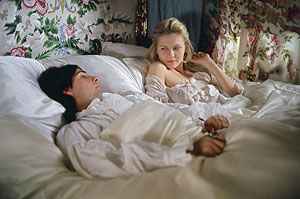 The great thing is that the atmosphere she creates on the set… she casts a spell, a mood. When you walk in a room and she’s on the other side, the air feels different. For me it was a pleasure to work with her.
The great thing is that the atmosphere she creates on the set… she casts a spell, a mood. When you walk in a room and she’s on the other side, the air feels different. For me it was a pleasure to work with her.
Q: It’s interesting that you talk about Sofia drawing from situations that are unalike, since that probably helps her aim this film at the younger audience. It connects the dots between their lives and Marie Antoinette’s.
Schwartzman: A lot of what I could draw on for this character came from my high school experience, specifically an inability to talk to girls. Even though my character doesn’t see it so much in the movie, I know what’s on his mind, and it’s people questioning his ability to do things. I would get that a lot in high school – I would walk by people and I would hear them laugh and I knew it was about me. I knew I was the butt of some random, drive-by joke.
And I just know how hard it was for me with girls in high school, where I would walk into a room and hope that somebody would like me and some other guy getting it. I wasn’t full of angst as an adolescent, but I was full of… what do you call that?
Q: Insecurity?
Schwartzman: It wasn’t insecurity.
Q: Paranoia?
Schwartzman: It wasn’t that wiry. It was more like Elvis Costello. Do you know what I mean? It was more like that. I was driven to want to connect and keep getting beaten down but wouldn’t stop trying.
Q: And you can connect that to Louis?
Schwartzman: In my head. Oh, and I went to a lot of Buster Keaton films. He didn’t say a lot. He’s so blank that you threw a lot on him, you projected a lot on him. This is going to sound trite, and I don’t want it to sound like I’m cutting these people down, but have you ever noticed how people are with their animals? Their animals don’t say anything but they feel they understand what they’re saying? I watched a lot of animals and a lot of animal movies, because they communicate so silently.
Q: This film has a lot of modern music in it. Is there a song that’s not in the film that you feel encapsulates Louis?
Schwartzman: Huh.
Let me think.
Give me a second to think.
…
We could sit here all day. It’ll be on my mind. Do you have one?
Q: No, sadly.
When you were at Versailles did you ever think that you were born in the wrong time?
Schwartzman: Sometimes I would think that would have been a wonderful time to be alive. It would be hard to go back… medically I don’t think it would be great for me. That’s what I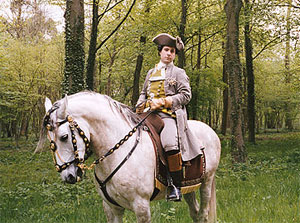 thought about. Just having a cavity – the pain would be really bad. And the lack of sanitation. There’s a lot not going that conflicts with what I believe in nowadays. But if I didn’t know any better, it would have been nice.
thought about. Just having a cavity – the pain would be really bad. And the lack of sanitation. There’s a lot not going that conflicts with what I believe in nowadays. But if I didn’t know any better, it would have been nice.
I would have gone for the 1950s or 60s.
Q: What happened at Cannes? There are so many stories, and I’ve heard that many French critics took umbrage with the portrayal of a king they saw as a tyrant.
Schwartzman: First of all, I know that the film was made with respect for these people. Sofia loves these people and that’s why she wanted to make a movie about them. Some part of her needed to make a movie about these people and I don’t think she would make a movie that was pointing fingers and had a message. Some part of her could relate emotionally and wanted to make an impressionistic film about these people that wasn’t a genre movie of a period piece.
As far as how French people feel about him, I was portraying a version of what I could relate to in someone, what I was asked to, and I did my best. I wasn’t trying to point any fingers or draw any comparisons, I was just doing my version of it – as everyone is entitled to do. I hope people like it.
Q: Were you at the Cannes premiere?
Schwartzman: It was kind of blown out of proportion. I don’t know what happened. I had a great time there and I came back and people said, ‘Are you OK?’ I think there was a press screening – I wasn’t at the theater – and apparently a couple of people booed. Which happens there all the time anyway. I don’t know. I don’t know why people do things. What I took away from it was that it was fun, and our screening had a warm reception. It was a chaotic time because it was so quick, but I had a good time there and I was happy to spend a couple of days there.
Q: You’re working with Wes Anderson again – you’ve co-written the script. Can you talk about the film?
Schwartzman: I cannot. I have a gag order.
Q: What’s the writing process like?
Schwartzman: The writing process is amazing. It’s like building a bridge while you’re on the bridge. It was scary and fun and I loved it. And I love Wes. It was intense and wonderful.
Q: You’re shooting in India?
Schwartzman: I get inoculated on Monday!
I’m still trying to think of this fucking song.
Q: How about something off Pet Sounds, something baroque yet wistful?
Schwartzman: OK.
Q: Maybe Wouldn’t It Be Nice – romantic but restrained. And sexually unconsummated.
Schwartzman: Ooh, yeah. Or I Just Wasn’t Meant For These Times.
Oh, I know what it would be. You know the opening song off Friends? “As I sit and close my eyes/There’s peace in my mind/And I’m hoping that you’ll find it too”
Something like that. I feel like it would be a song about, ‘I’m OK and you don’t think that I am but this is what I’m trying to tell you!’ You know, like that.